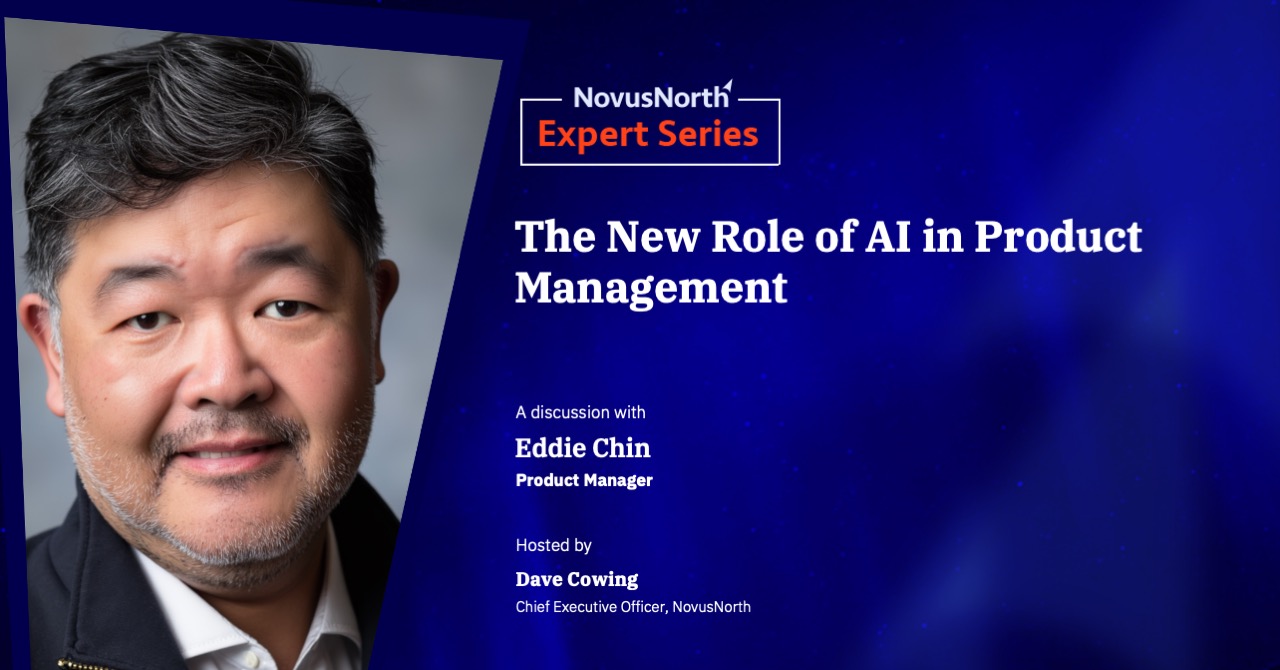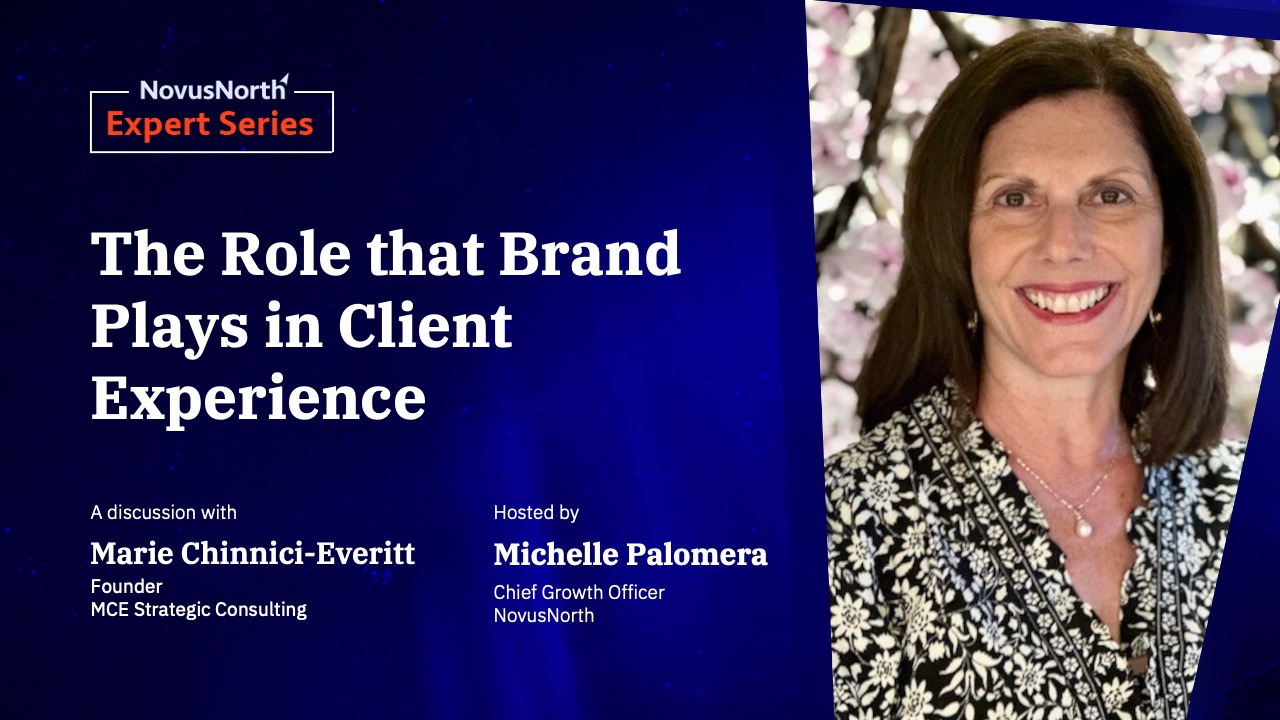In this edition of NovusNorth’s thought leadership conversation, Dave Cowing, CEO of NovusNorth, had an opportunity to meet Susan Westwater, prominent voice researcher, instructor and author.
Susan is an instructor at the Marketing Al Institute’s Al Academy, an Ambassador for the Open Voice Network, and co-author of Voice Strategy: Creating Useful and Usable Experiences, and Voice Marketing (coming in 2023).
NovusNorth is an expert-lead provider of product design, development and delivery services for the FinTech and financial services industry. At NovusNorth, we believe that great digital experiences drive great business outcomes.
In this article, we summarize the conversation between Dave Cowing and Susan Westwater.
Read the Transcript
Q: What do we mean by voice? What is it and what value does it provide?
Susan Westwater
Voice has a lot of components and underpinnings to it. At a very, very broad level when we talk about voice, it is essentially simply an interaction that allows you to control or interact with the device using your voice or natural language. Now, that could be passive, where you’re just listening. Or it could be active where you’re having an exchange back and forth, command control, or something along those lines. But we started at that high level, just because there’s so many pieces that fall underneath it.
“We’re seeing that people are doing things along the entire customer journey with voice”
– Susan Westwater
“We’re seeing that people are doing things along the entire customer journey with voice”
– Susan Westwater
Q: What are the top three use cases you’re seeing for voice in today’s market?
Susan Westwater
We did some research in the Voice Consumer Index in 2021. And then have now just released as of today, the 2022 Voice Consumer Index. And within there when we were looking at tasks of what it is that people are looking for, the number one is 92% of folks use it to ask questions. It’s an incredible use case in the perspective of is that frequently asked questions, is that customer service, is it things along those lines, those are those are really important entry level. Of course, listening to music, getting news, those are entry level. But the reality is, is what we’re seeing that people are doing things along the entire customer journey. And so that means it is things like starting with awareness of asking questions about things, consideration, researching products, finding things that are local to them. And then it even goes into the culmination of purchase. And then troubleshooting, onboarding and all of those pieces. And we see that all along, which can be tracking packages, or when it comes to financial services, getting account status or doing things along those lines.
Q: What are some of the key trends that you’re tracking in the voice space?
Susan Westwater
Obviously, you can’t go talk about voice or talk about key trends without bringing up the M word being metaverse. That is something that’s definitely there and voice is at the heart of it because we’re not going to type our inputs into the metaverse, we’re going to speak them. So that’s going to be an important part of how does that what’s that relationship.
The other part that we’re seeing is Sonic branding. And that goes again, hand in hand with all of the other things that we’re seeing from a Metaverse or just an immersive experience perspective of how does your brand sound without being disruptive. So that can be more than a jingle. Actually, it should be more than a jingle. But also then what is the persona of your brand. If it is truly a person, voice and tone become very real and literal. What does it sound like? Does that system persona have more than one, actually. A brand persona sometimes can be male, female, or what have you. So it is understanding all of those pieces of that UX perspective. And I think we also see trends of looking at an omni channel perspective of how do I use voice. We typically think of the voice speakers and we think of Alexa and Google Assistant. But the reality is how does voice work on the web? How does voice work on my phone? And those are things that we’re seeing where it’s the integrated approach of how does voice and audio content live and how do we make those exchanges helpful and also valuable?
“What is the persona of your brand? If it is truly a person, voice and tone become very real and literal”
– Susan Westwater
“What is the persona of your brand? If it is truly a person, voice and tone become very real and literal.”
– Susan Westwater
Q: There have been lots of discussion and even some big issues around privacy and security, most notably the discovery of Alexa recording and sharing things in ways that we didn’t understand. What’s going on in the industry around the notion of privacy and ethics?
Susan Westwater
As an ambassador of the Open Voice Network, that is something that’s very near and dear to my heart. At OVN, our charter is to make voice assistants worthy of user trust and trust is big word. There’s a lot of layers to it. But one of the things that we did see, when we ran the Voice Consumer Index in 2022 compared to 2021, is that we are starting to see distrust back off a little bit, but it’s still a concern. And what that means is understanding from a perspective of what happens to your data, is it secure, because there’s privacy from a perspective of that no one hears what I’m saying, but then there’s security of can no one else access it.
I think what has helped with that number going down slightly has been disclosure and expectation management and understanding policies that come out to that place. The Open Voice Network is at the heart of that weighing in and working with European and as well as US-based groups to help them understand what are the implications so that we don’t throw the baby out with the bathwater, so to speak. Because we do have people say I want all my information, but I also want you to give me recommendations that are based on my preferences. So how do we make sure that that value exchange is there. And also, how do we make sure that there’s full disclosure that people are aware of? Yes, they’re going to use my data for this. Yes, they’re going to take this piece of data and use it that way. So, my guidance to everyone is when you use data, you’re promising you’re going to keep it safe. But you’re also going to do something useful with it, you’re going to do something valuable to ask for that. And so, in that expectation management, you begin to build that trust in that bond of saying, you know, we’re not just asking it, because it’s nice to have, we’re asking it because it makes a better experience for you.
“When you use data, you’re promising you’re going to keep it safe, but you’re also going to do something useful with it.”
– Susan Westwater
“When you use data, you’re promising you’re going to keep it safe, but you’re also going to do something useful with it.”
– Susan Westwater
Q: What are some of the ways that you would recommend companies approach getting started with voice?
Susan Westwater
A lot of times when we’re talking to a team, they’re saying, “We haven’t gotten social right. Are you kidding me, I have another channel to cover off on?” And I have total empathy for that. Or “We’re still trying to get our web content updated. Now you’re telling me it has to be audio and I need to rethink instead of keywords long tail search for Voice Search?”
What I would say is, it’s sort of a three-prong approach of a maturity model of going from an idea of optimizing the content. You have to be searchable, findable, discoverable, optimizing that content, using it in different ways. Then moving into the idea of creating. do I create a voice skill? Do I create a custom assistant? Do I create something that then is the embodiment of that Assistant and how that lives?
And then you go into integration. Where do I put it all? Does it all work together? But it should, I mean, voice is not a silo. Neither is our content. So, it’s understanding what your customers problems are? And if you don’t, that’s where to start. Taking that and then basically progressively crawl, walk, run and looking at that way. So admittedly, a lot of the work that we have been doing as of late, especially as a voice strategist, is looking at that discovery perspective. And how does that strategy unfold in a way that’s basically leading with user needs meeting those needs, but also then in the background, also supporting business objectives, because you have to have both for winning combination.
Now across this to ensure that you’re moving in the right direction you need to install a measurement framework. This will allow you to track the successful the success of the initiatives, and of the overall program.
Now to round out this framework you have standards, methodology skills, measurement. And finally, you need to overlay this with a governance model that’s going to work effectively in your culture.
Q: What are the three top lessons or risks that you’ve seen companies that have embarked on the voice journey?
Susan Westwater
There’s a couple that I’ve seen. The most important one is launch doesn’t mean done, especially in this world. Part of it is because we’re building our language models. We’re learning how people ask for things, but we’re also learning what they want to do. And so just as our users kind of go from why would I ever want to do that to how did I live without that, we have to be there for them and help guide that along. So, with that launch, it’s the iteration and the optimization. And there are a number of case studies out there where what was launched was what was a great first, you know, 1.0. And then from those learnings, the 2.0, and then seeing the conversions change, because we were able to iterate and see how people actually use it.
“Launch doesn’t mean done.”
– Susan Westwater
“Launch doesn’t mean done.”
– Susan Westwater
The second thing I would say, that’s really, really important, is there’s a tendency, especially with voice projects, of still being skunkworks, or R&D, or something along those lines. What happens with that is that you build this wonderful thing when you get to creation, or you get to this optimization and we forget that, while it’s intuitive on how to speak and use voice, it’s not obvious which brands are there and what they offer. So, it’s important to make sure that you have a whole marketing plan, that also then says, “Hey, we’ve created this special thing for you. We want to meet your needs, by the way, here’s how to use it.” We went through that in digital, you know, through the advent of the web, even on mobile, social, all those things – we kind of have to do that still these days. And it’s not because of adoption, it’s just teaching people this is what you need to know to use it. And I think the final thing is, and I mentioned it earlier, is you’ve already started. So, you know your customers challenges. You know how your call center is talking to people. You know what your sales folks are succeeding on selling. Those are the same things to be thinking about, as you think about what is this voice piece to do?
And I will add one final thing, just because it’s cool is not a very good strategy. We want it to be, don’t we? I mean, I don’t know how much wouldn’t it be cool. But the reality is, is that we really do need to think about the idea of useful and usable. And that idea of what problems am I solving and understanding that it is sometimes it may feel unsexy. But if that’s what someone wants, that’s sexy enough, because that’ll continue to encourage someone to continue to use it. And that’ll also foster great feelings about your brand.
About The Experts

Susan Westwater
Prominent voice researcher, instructor and author
Susan Westwater advises some of the world’s best known brands on how to capitalize on the incredible opportunity voice and conversational AI represent. Susan helps clients reach their marketing objectives by using customer-centric approaches to plan and create innovative voice experiences for their audiences. She has presented and authored a number of talks, workshops, articles, and ebooks focused on the role Voice technology plays in marketing and business strategy. Susan co-authored the book Voice Strategy: Creating Useful and Usable Voice Experiences which was a #1 Release on Amazon and is co-author of Voice Marketing (coming in 2023). She is also an Ambassador of the Open Voice Network, an instructor for the Marketing AI Institute AI Academy, and a member of Women in Voice. She is recognized by her peers as a thought leader in innovation and voice technology and in 2020, she was recognized as a Top Voice Influencer in Voicebot’s Top 68 Leaders in Voice.

Dave Cowing
Chief Executive Officer and Co-Founder of NovusNorth
NovusNorth is an outcome-oriented experience consultancy that drives business results by creating compelling experiences for customers and employees in the fintech and financial services industry. Dave has 30 years of experience helping companies ranging from Fortune 500 market leaders to disruptive startups with new ideas.
In this edition of NovusNorth’s thought leadership conversation, Dave Cowing, CEO of NovusNorth, had an opportunity to meet Susan Westwater, prominent voice researcher, instructor and author.
Susan is an instructor at the Marketing Al Institute’s Al Academy, an Ambassador for the Open Voice Network, and co-author of Voice Strategy: Creating Useful and Usable Experiences, and Voice Marketing (coming in 2023).
NovusNorth is an expert-lead provider of product design, development and delivery services for the FinTech and financial services industry. At NovusNorth, we believe that great digital experiences drive great business outcomes.
In this article, we summarize the conversation between Dave Cowing and Susan Westwater.
Read the Transcript
Q: What do we mean by voice? What is it and what value does it provide?
Susan Westwater
Voice has a lot of components and underpinnings to it. At a very, very broad level when we talk about voice, it is essentially simply an interaction that allows you to control or interact with the device using your voice or natural language. Now, that could be passive, where you’re just listening. Or it could be active where you’re having an exchange back and forth, command control, or something along those lines. But we started at that high level, just because there’s so many pieces that fall underneath it.
“We’re seeing that people are doing things along the entire customer journey with voice”
– Susan Westwater
“We’re seeing that people are doing things along the entire customer journey with voice”
– Susan Westwater
Q: What are the top three use cases you’re seeing for voice in today’s market?
Susan Westwater
We did some research in the Voice Consumer Index in 2021. And then have now just released as of today, the 2022 Voice Consumer Index. And within there when we were looking at tasks of what it is that people are looking for, the number one is 92% of folks use it to ask questions. It’s an incredible use case in the perspective of is that frequently asked questions, is that customer service, is it things along those lines, those are those are really important entry level. Of course, listening to music, getting news, those are entry level. But the reality is, is what we’re seeing that people are doing things along the entire customer journey. And so that means it is things like starting with awareness of asking questions about things, consideration, researching products, finding things that are local to them. And then it even goes into the culmination of purchase. And then troubleshooting, onboarding and all of those pieces. And we see that all along, which can be tracking packages, or when it comes to financial services, getting account status or doing things along those lines.
Q: What are some of the key trends that you’re tracking in the voice space?
Susan Westwater
Obviously, you can’t go talk about voice or talk about key trends without bringing up the M word being metaverse. That is something that’s definitely there and voice is at the heart of it because we’re not going to type our inputs into the metaverse, we’re going to speak them. So that’s going to be an important part of how does that what’s that relationship.
The other part that we’re seeing is Sonic branding. And that goes again, hand in hand with all of the other things that we’re seeing from a Metaverse or just an immersive experience perspective of how does your brand sound without being disruptive. So that can be more than a jingle. Actually, it should be more than a jingle. But also then what is the persona of your brand. If it is truly a person, voice and tone become very real and literal. What does it sound like? Does that system persona have more than one, actually. A brand persona sometimes can be male, female, or what have you. So it is understanding all of those pieces of that UX perspective. And I think we also see trends of looking at an omni channel perspective of how do I use voice. We typically think of the voice speakers and we think of Alexa and Google Assistant. But the reality is how does voice work on the web? How does voice work on my phone? And those are things that we’re seeing where it’s the integrated approach of how does voice and audio content live and how do we make those exchanges helpful and also valuable?
“What is the persona of your brand? If it is truly a person, voice and tone become very real and literal”
– Susan Westwater
“What is the persona of your brand? If it is truly a person, voice and tone become very real and literal.”
– Susan Westwater
Q: There have been lots of discussion and even some big issues around privacy and security, most notably the discovery of Alexa recording and sharing things in ways that we didn’t understand. What’s going on in the industry around the notion of privacy and ethics?
Susan Westwater
As an ambassador of the Open Voice Network, that is something that’s very near and dear to my heart. At OVN, our charter is to make voice assistants worthy of user trust and trust is big word. There’s a lot of layers to it. But one of the things that we did see, when we ran the Voice Consumer Index in 2022 compared to 2021, is that we are starting to see distrust back off a little bit, but it’s still a concern. And what that means is understanding from a perspective of what happens to your data, is it secure, because there’s privacy from a perspective of that no one hears what I’m saying, but then there’s security of can no one else access it.
I think what has helped with that number going down slightly has been disclosure and expectation management and understanding policies that come out to that place. The Open Voice Network is at the heart of that weighing in and working with European and as well as US-based groups to help them understand what are the implications so that we don’t throw the baby out with the bathwater, so to speak. Because we do have people say I want all my information, but I also want you to give me recommendations that are based on my preferences. So how do we make sure that that value exchange is there. And also, how do we make sure that there’s full disclosure that people are aware of? Yes, they’re going to use my data for this. Yes, they’re going to take this piece of data and use it that way. So, my guidance to everyone is when you use data, you’re promising you’re going to keep it safe. But you’re also going to do something useful with it, you’re going to do something valuable to ask for that. And so, in that expectation management, you begin to build that trust in that bond of saying, you know, we’re not just asking it, because it’s nice to have, we’re asking it because it makes a better experience for you.
“When you use data, you’re promising you’re going to keep it safe, but you’re also going to do something useful with it.”
– Susan Westwater
“When you use data, you’re promising you’re going to keep it safe, but you’re also going to do something useful with it.”
– Susan Westwater
Q: What are some of the ways that you would recommend companies approach getting started with voice?
Susan Westwater
A lot of times when we’re talking to a team, they’re saying, “We haven’t gotten social right. Are you kidding me, I have another channel to cover off on?” And I have total empathy for that. Or “We’re still trying to get our web content updated. Now you’re telling me it has to be audio and I need to rethink instead of keywords long tail search for Voice Search?”
What I would say is, it’s sort of a three-prong approach of a maturity model of going from an idea of optimizing the content. You have to be searchable, findable, discoverable, optimizing that content, using it in different ways. Then moving into the idea of creating. do I create a voice skill? Do I create a custom assistant? Do I create something that then is the embodiment of that Assistant and how that lives?
And then you go into integration. Where do I put it all? Does it all work together? But it should, I mean, voice is not a silo. Neither is our content. So, it’s understanding what your customers problems are? And if you don’t, that’s where to start. Taking that and then basically progressively crawl, walk, run and looking at that way. So admittedly, a lot of the work that we have been doing as of late, especially as a voice strategist, is looking at that discovery perspective. And how does that strategy unfold in a way that’s basically leading with user needs meeting those needs, but also then in the background, also supporting business objectives, because you have to have both for winning combination.
Now across this to ensure that you’re moving in the right direction you need to install a measurement framework. This will allow you to track the successful the success of the initiatives, and of the overall program.
Now to round out this framework you have standards, methodology skills, measurement. And finally, you need to overlay this with a governance model that’s going to work effectively in your culture.
Q: What are the three top lessons or risks that you’ve seen companies that have embarked on the voice journey?
Susan Westwater
There’s a couple that I’ve seen. The most important one is launch doesn’t mean done, especially in this world. Part of it is because we’re building our language models. We’re learning how people ask for things, but we’re also learning what they want to do. And so just as our users kind of go from why would I ever want to do that to how did I live without that, we have to be there for them and help guide that along. So, with that launch, it’s the iteration and the optimization. And there are a number of case studies out there where what was launched was what was a great first, you know, 1.0. And then from those learnings, the 2.0, and then seeing the conversions change, because we were able to iterate and see how people actually use it.
“Launch doesn’t mean done.”
– Susan Westwater
“Launch doesn’t mean done.”
– Susan Westwater
The second thing I would say, that’s really, really important, is there’s a tendency, especially with voice projects, of still being skunkworks, or R&D, or something along those lines. What happens with that is that you build this wonderful thing when you get to creation, or you get to this optimization and we forget that, while it’s intuitive on how to speak and use voice, it’s not obvious which brands are there and what they offer. So, it’s important to make sure that you have a whole marketing plan, that also then says, “Hey, we’ve created this special thing for you. We want to meet your needs, by the way, here’s how to use it.” We went through that in digital, you know, through the advent of the web, even on mobile, social, all those things – we kind of have to do that still these days. And it’s not because of adoption, it’s just teaching people this is what you need to know to use it. And I think the final thing is, and I mentioned it earlier, is you’ve already started. So, you know your customers challenges. You know how your call center is talking to people. You know what your sales folks are succeeding on selling. Those are the same things to be thinking about, as you think about what is this voice piece to do?
And I will add one final thing, just because it’s cool is not a very good strategy. We want it to be, don’t we? I mean, I don’t know how much wouldn’t it be cool. But the reality is, is that we really do need to think about the idea of useful and usable. And that idea of what problems am I solving and understanding that it is sometimes it may feel unsexy. But if that’s what someone wants, that’s sexy enough, because that’ll continue to encourage someone to continue to use it. And that’ll also foster great feelings about your brand.
About The Experts

Susan Westwater
Prominent voice researcher, instructor and author
Susan Westwater advises some of the world’s best known brands on how to capitalize on the incredible opportunity voice and conversational AI represent. Susan helps clients reach their marketing objectives by using customer-centric approaches to plan and create innovative voice experiences for their audiences. She has presented and authored a number of talks, workshops, articles, and ebooks focused on the role Voice technology plays in marketing and business strategy. Susan co-authored the book Voice Strategy: Creating Useful and Usable Voice Experiences which was a #1 Release on Amazon and is co-author of Voice Marketing (coming in 2023). She is also an Ambassador of the Open Voice Network, an instructor for the Marketing AI Institute AI Academy, and a member of Women in Voice. She is recognized by her peers as a thought leader in innovation and voice technology and in 2020, she was recognized as a Top Voice Influencer in Voicebot’s Top 68 Leaders in Voice.

Dave Cowing
Chief Executive Officer and Co-Founder of NovusNorth
NovusNorth is an outcome-oriented experience consultancy that drives business results by creating compelling experiences for customers and employees in the fintech and financial services industry. Dave has 30 years of experience helping companies ranging from Fortune 500 market leaders to disruptive startups with new ideas.
Let’s Talk!
Trying to find your new north? Get in touch to find out how we can work together to achieve the business outcomes you need.
Our Latest Insights
Experience strategist and transformation leader, Erin Helcl, shares her insights on why product and service design need to evolve now for an AI future and what designers and organizations can do to be ready.
By NovusNorth
Veteran Product Manager, Eddie Chin, shares his vision on the future of product management and how AI will become a coach for product managers and teams.
By NovusNorth
Founder and Principal of MCE Strategic Consulting Marie Chinnici-Everitt, shares how companies can make a stronger connection between their brand and delivering a superior client experience in today’s competitive landscape in financial services.
By NovusNorth



